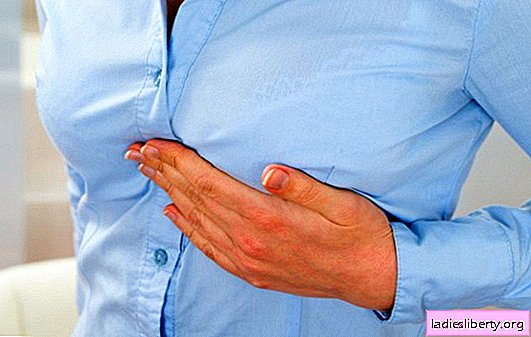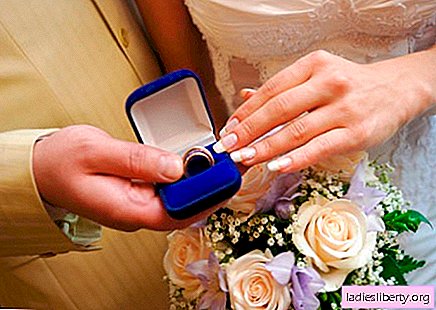
According to statistics, 90% of girls and women have chest pains a week before menstruation. Many may not notice these pains or not pay attention to them because of the lack of expression of sensations, but for some they significantly affect the quality of life. Discomfort or pain in the chest area may not pose any health hazard, but sometimes accompany serious pathology. Therefore, it is necessary to navigate in each case: pain is a physiological phenomenon or manifestation of a disease.
If the sensations are new, and this has not happened before, a specialist consultation is necessary, who will prescribe adequate treatment if necessary.
Causes of chest pain a week before menstruation
Often the line between the norm and pathology is very small and it is not always possible to independently determine why the chest hurts a week before menstruation.
Mastodynia - chest pain a week before menstruation - a phenomenon caused by the proliferation of cells of the glandular and adipose tissues of the mammary glands. It does not apply to pathology. It occurs as a result of physiological changes in the body: when a fully matured egg leaves the follicle, the production of estrogen increases (the body prepares for pregnancy). They cause significant changes in the tissues of the mammary glands.
The causes of breast pain a week before menstruation are hormonal changes that occur in the body. The mammary gland is built of many lobules. Each of them consists of glandular, connective and adipose tissue. The milk duct passes through the lobule. Estrogens are localized in fatty tissue. With their increased formation, the volume of adipose tissue significantly increases. Glandular tissue also grows - preparation for lactation is in progress. Under the influence of high levels of prolactin and progesterone, edema and coarsening of the mammary gland occur, in connection with which sensitivity increases and, as a result, pain occurs.
Stress and nerve stress often contribute to pain.
Each woman has a different intensity of pain. They last for a week or more - until the onset of menstruation, which for the body is an unforeseen pregnancy. With the onset of menstruation, the pain stops. Atrophy of the overgrown glandular tissue occurs until the next menstruation, which causes a complete cessation of pain.
Pain, in addition to intensity, can be different in localization. Since the asymmetry of the mammary glands is considered a physiological norm (this is an individual phenomenon), a woman can also have more pain in one of the glands. For example, due to the fact that the right mammary gland is slightly larger than the left, the irritation of the ends of the nerve receptors of the right breast can be more pronounced and, accordingly, with hormonal changes, pain on the right can be more worrying.
It should be noted that in the absence of a concomitant pathology of pain, as a rule, they are weakly expressed and may not cause any discomfort. With a balanced hormonal background, pain is minimal.
Some women have a low sensitivity of the mammary glands, and then all the processes that occur in the glands before menstruation (tightening, proliferation and atrophy of tissues or a rush of blood to the chest) do not cause any unpleasant sensations. In such cases, pain does not appear, mastodynia does not develop.
The vast majority of girls and women have chest pains a week before menstruation simultaneously with the lower abdomen.
Causes of chest pain in the absence of menstruation
It happens that chest pains are disturbing in the absence of menstruation. You need to immediately understand why this happens. Most likely causes:
• it can be a stretching of muscles after physical exertion (weight lifting; perhaps training);
• pregnancy, including ectopic;
• mastopathy, which affects more than 70% of women - the growth of the connective tissue of the mammary glands with the formation of seals (diffuse, nodular or mixed), is associated with hormonal disorders;
• chest changes, inflammatory processes (pneumonia), osteochondrosis;
• trauma or chest surgery;
• some drugs (in particular, antidepressants, diuretics, steroid drugs);
• endocrine pathology - various thyroid diseases.
A hereditary predisposition, overeating, obesity, and prolonged use of oral contraceptives also play a role.
What to do if your chest hurts a week before your period
In cases where such a condition can be sustained before the onset of menstruation, or if it does not cause severe discomfort, there is no cause for concern. No action is necessary.
If after the cessation of menstruation the pain does not stop or become more intense, you should consult a doctor. This is no longer the norm.
Pain is provoked by various reasons:
• hormonal imbalance;
• a cold;
• stresses;
• gynecological diseases;
• tumors, etc.
A drastic change in the menstrual cycle is an occasion to visit a specialist:
• pain arose for the first time;
• pain and engorgement of the mammary gland, previously always occurring during this period, suddenly disappeared before the onset of menstruation.
In such cases, especially if it has already been observed for several months, consultation is simply necessary, since a similar condition may be associated with a decrease in progesterone levels. In turn, this leads to the impossibility of conception and bearing a child. In addition, this condition may be the beginning of menopause.
Self-examination and mandatory diagnostics
In order not to miss a serious pathology and not to delay the treatment, in addition to preventive visits to a gynecologist and mammologist, you need to independently examine the mammary glands at least once a month.
The procedure is as follows:
alternately grabbing the chest from below with the hand, palpate the gland from the base to the nipple with the fingers of the free hand.
In case of detection of seals or pathological discharge from the nipples, it is necessary to consult a mammologist. In the absence of changes, but ongoing pain, you need to contact a gynecologist. In each individual case, an appropriate examination is prescribed and, if necessary, treatment. Common to all methods of dealing with a similar problem does not exist.
Mandatory examinations are:
• determination of thyroid hormones and a blood test for prolactin;
• blood test for tumor markers (the risk of developing cancer is determined);
• Uterine ultrasound with appendages;
• Ultrasound of the mammary glands.
How to reduce pain
Comprehensive measures must be taken to reduce chest pain or discomfort. If after the examination it becomes clear that there is no pathology, hormonal imbalance and any neoplasms, the treatment of mastodynia consists in maintaining the water-salt balance and in ordering physical activity.
You need to start with a diet. It includes:
• restriction of fluid, salty and fatty foods;
• refusal or significant reduction in the use of strong tea, coffee, alcohol;
• rejection of tight, squeezing chest clothing and underwear.
Medication in the second half of the cycle (only as directed by a doctor):
• if the pain persists for a long time, vitamin complexes with a high content of magnesium or magnesium preparations will help;
• hormonal contraceptives;
• drugs that reduce the production of prolactin - a female sex hormone;
• herbal medicines that prevent the development of mastodynia;
• painkillers to relieve severe pain;
• in the presence of a purulent focus, antibacterial agents are used;
• herbal preparations with anti-inflammatory and soothing effects.
Tumors, cysts and other formations are treated surgically.
Thus, cyclic proliferation, consisting of alternating growth and atrophy of mammary gland tissue throughout the entire menstrual cycle, refers to physiological processes and is the norm for any woman of childbearing age.
To prevent the occurrence of chest pain a week before the onset of menstruation, it is necessary to exclude stress, nervous stress, hypothermia, carefully treat your feelings. You need to find enough time for proper rest and sleep. And it is important: not to self-medicate, but to consult a doctor in a timely manner for professional advice.











